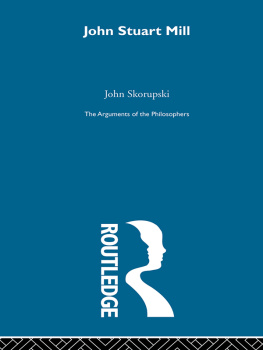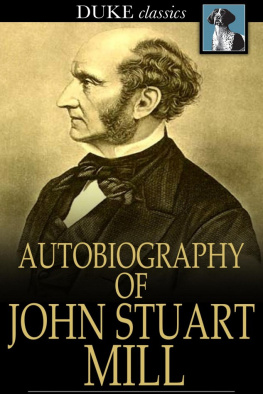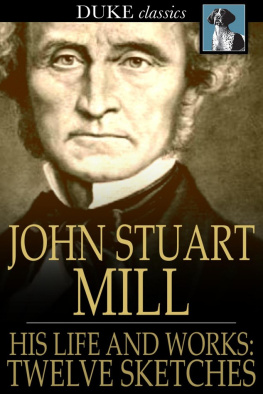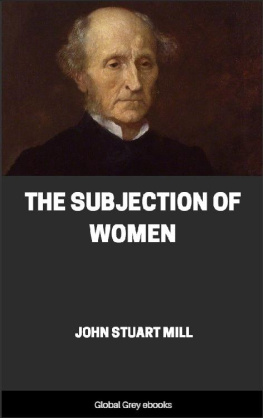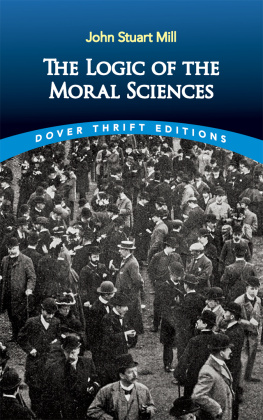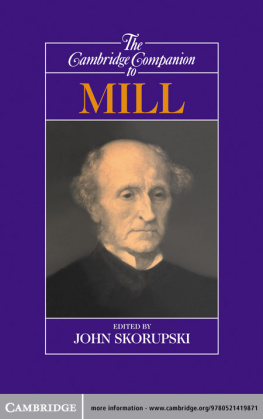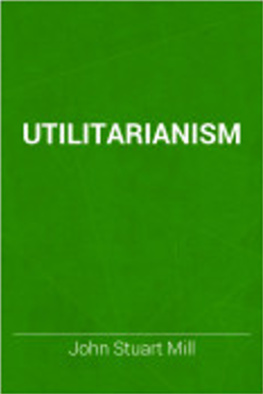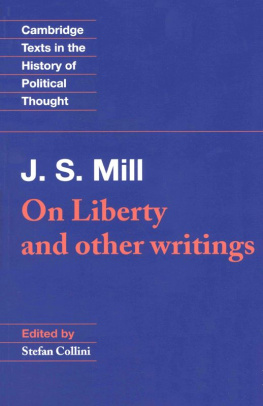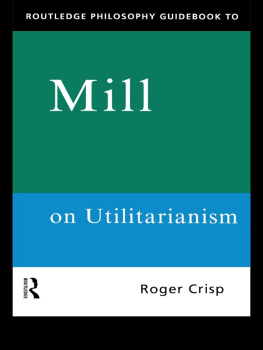Mill John Stuart - John Stuart Mill
Here you can read online Mill John Stuart - John Stuart Mill full text of the book (entire story) in english for free. Download pdf and epub, get meaning, cover and reviews about this ebook. City: London, New York, year: 1999, publisher: Taylor and Francis; Routledge, genre: Religion. Description of the work, (preface) as well as reviews are available. Best literature library LitArk.com created for fans of good reading and offers a wide selection of genres:
Romance novel
Science fiction
Adventure
Detective
Science
History
Home and family
Prose
Art
Politics
Computer
Non-fiction
Religion
Business
Children
Humor
Choose a favorite category and find really read worthwhile books. Enjoy immersion in the world of imagination, feel the emotions of the characters or learn something new for yourself, make an fascinating discovery.
- Book:John Stuart Mill
- Author:
- Publisher:Taylor and Francis; Routledge
- Genre:
- Year:1999
- City:London, New York
- Rating:3 / 5
- Favourites:Add to favourites
- Your mark:
- 60
- 1
- 2
- 3
- 4
- 5
John Stuart Mill: summary, description and annotation
We offer to read an annotation, description, summary or preface (depends on what the author of the book "John Stuart Mill" wrote himself). If you haven't found the necessary information about the book — write in the comments, we will try to find it.
John Stuart Mill — read online for free the complete book (whole text) full work
Below is the text of the book, divided by pages. System saving the place of the last page read, allows you to conveniently read the book "John Stuart Mill" online for free, without having to search again every time where you left off. Put a bookmark, and you can go to the page where you finished reading at any time.
Font size:
Interval:
Bookmark:
JOHN STUART MILL
EDITOR: TED HONDERICH
The purpose of this series is to provide a contemporary assessment and history of the entire course of philosophical thought. Each book constitutes a detailed, critical introduction to the work of a philosopher of major influence and significance.
Plato J.C.B.Gosling
Augustine Christopher Kirwan
The Presocratic Philosophers Jonathan Barnes
Plotinus Lloyd P.Gerson
The Sceptics R.J.Hankinson
Socrates Gerasimos Xenophon Santas
Berkeley George Pitcher
Descartes Margaret Dauler Wilson
Hobbes Tom Sorell
Locke Michael Ayers
Spinoza R.J.Delahunty
Bentham Ross Harrison
Hume Barry Stroud
Butler Terence Penelhum
John Stuart Mill John Skorupski
Thomas Reid Keith Lehrer
Kant Ralph C.S.Walker
Hegel M.J.Inwood
Schopenhauer D.W.Hamlyn
Kierkegaard Alastair Hannay
Nietzsche Richard Schacht
Karl Marx Allen W.Wood
Gottlob Frege Hans D.Sluga
Meinong Reinhardt Grossmann
Husserl David Bell
G.E.Moore Thomas Baldwin
Wittgenstein Robert J.Fogelin
Russell Mark Sainsbury
William James Graham Bird
Peirce Christopher Hookway
Santayana Timothy L.S.Sprigge
Dewey J.E.Tiles
Bergson A.R.Lacey
J.L.Austin G.J.Warnock
Karl Popper Anthony OHear
Ayer John Foster
Sartre Peter Caws
JOHN STUART MILL
The Arguments of the Philosophers
John Skorupski

London and New York
First published 1989 by Routledge
First published in paperback 1992
This edition reprinted in hardback 1999, 2000, 2002
by Routledge
2 Park Square, Milton Park, Abingdon, Oxon, OX14 4RN
Simultaneously published in the USA and Canada
by Routledge
270 Madison Avenue, New York, NY 10016
Transferred to Digital Printing 2005
Routledge is an imprint of the Taylor & Francis Group
This edition published in the Taylor & Francis e-Library, 2010.
To purchase your own copy of this or any of Taylor & Francis or Routledges collection of thousands of eBooks please go to www.eBookstore.tandf.co.uk.
1989 John Skorupski
All rights reserved. No part of this book may be reprinted or reproduced or
utilized in any form or by any electronic, mechanical, or other means, now
known or hereafter invented, including photocopying and recording, or in
any information storage or retrieval system, without permission in writing
from the publishers.
British Library Cataloguing in Publication Data
A catalogue record for this book is available from the British Library
Library of Congress Cataloguing in Publication Data
A catalogue record for this book has been requested
ISBN 0-203-87024-7 Master e-book ISBN
ISBN 0-415-20365-1
ISBN 0-415-20392-9 (set)
Publishers note
The publisher has gone to great lengths to ensure the quality of this reprint but points out that some imperfections in the original book may be apparent.
FOR BARBARA
WITH LOVE
John Stuart Mill looms in the central massif of nineteenth century thought; one of its highest peaks, gaunt in appearance, cloud-capped, chilly. The outline casts its shadow on lower hillsit is regularly used to take bearings on thembut climbers on its high ridges remain few.
The same could be said of other major nineteenth-century philosophers; we are only slowly beginning to take stock of their legacy, and to locate ourselves, as the heroic phase of twentieth-century philosophy recedes, in relation to it. But it is particularly true, I think in the case of Mill. Though his reputation continues to revive, there is still no accurate revaluation of the most fundamental points in his philosophy. Yet his questions, his answers, and their difficulties are all readily understandable in todays perspective. Not every vast nineteenth-century canvas repays the painstaking work of restoration, but in this case the result is incisive and fresh.
This book traces Mills arguments, tests their strength and suggests alternatives. Some of it, inevitably, enters into complicated detail, but I have tried to keep the larger picture in view. In the first chapter I sketch out the main themes of Mills philosophical thought. There is an impressive steadiness and scope in Mills vision; he tackles very big themes right out in the open, for an audience of intelligent readers; he tries to bring pure philosophy into contact with life and thought.
Anyone who does that runs the dangers of pontificating, spreading himself too thinly, hurrying over difficult issues too quickly. Mill can be absolved of none of these things. And it must be confessed that there is something glacial about the philosopher as public figure. Mill fits into no cosy group, no shared esoteric languagebut neither does he cast himself as the romantic outsider, observing human society from the desert or the bush. His chosen role is to educate the serious-minded; his philosophical stance is numbingly comprehensive, lucid and systematic. He magisterially treats of mind, society, politics, economics, culture. If Bacon wrote philosophy like a Lord Chancellor, Mill all too often writes it like a self-appointed Royal Commission.
The grand manner risks sounding hollowespecially when expressed in plain and sober prose which mercilessly exposes bits of mere blur or filling. Some of Mills more substantive political writings suffer badly from a lack of the nuance and self-irony which attractive political writing needs. They generate horror Victorianorum. But his more purely philosophical works are saved by their incisiveness and humanity. There is little pot-boiling in them; they are packed with crisp argument. We can learn a great deal from these arguments, but it is from Mills strategic vision that we have most to learnexpecially about the necessary relations between philosophy, culture and politics.
Mill is very English. The English tradition of the philosopher and practical man of sense, and the English paradox of the conservative radical, go far to explain the strengths and weaknesses of his mind. Like Locke or Butler he values intelligibility above laboriously achieved precision. He is humane and balanced rather than playful and ingenious, incisive and strategic rather than carefully worked-over and exact. Another comparison would be with George Orwell: Mill has the same conservative radicalism, centring on hatred of domination but fear of the atomised human mass, the same liking for honest language, the same wistfully prosaic mind. He liked to lecture his compatriots about the virtues of continental thought, but it was from the island of Albion that he did so.
This is no provincialism: the resources of the English intellectual and moral tradition gave Mill the strength and materials to write earnestly and simply and to encounter continental ideas on equal terms. It was another Englishman, Bishop Butler, who spoke of the uniformity of thought and design, which will always be found in the writings of the same person, when he writes with simplicity and in earnest (Butler 1970:16): that uniformity is found in Mill.
The layout of this book is determined by four of Mills works: the
Font size:
Interval:
Bookmark:
Similar books «John Stuart Mill»
Look at similar books to John Stuart Mill. We have selected literature similar in name and meaning in the hope of providing readers with more options to find new, interesting, not yet read works.
Discussion, reviews of the book John Stuart Mill and just readers' own opinions. Leave your comments, write what you think about the work, its meaning or the main characters. Specify what exactly you liked and what you didn't like, and why you think so.

